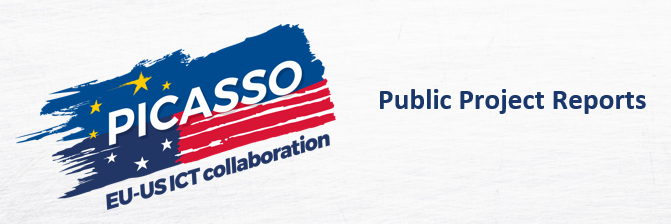Standards setting and development within a single sector does not keep pace anymore with evolving business interests across sectors and standards competition. ICT penetration is often portrayed as a form of convergence; if “general purpose” ICTs can be used across sectors, the benefits of broad-based or flexible standards may increase and existing standards may need substantial revision. But the implications for standards and their implementations are not simple and the extent of convergence should not be over-emphasised. These “crossovers” argue for a networked (as opposed to a federated or hierarchical) structure of standardisation.
In the context of the project PICASSO, policy experts met with experts and stakeholders in the fields of 5G networks, Big Data, and the Internet of Things (CPS) to discuss the role of standards in the context if EU/US ICT collaboration. These meetings resulted in a number of observations.
With re-usable and flexible standards, 5G networks, Big Data services and applications and the Internet of Things/CPS will develop and realise their full beneficial contributions to societal digitisation. Standardisation is needed for these technologies to flourish as the power of speed and scope will mean that an ever-widening range of activities will be carried out with minimal human intervention.
The only way to ensure that these developments address existing challenges without creating new risks and existential threats is through a full understanding of the way these systems will evolve and appropriate ‘ground rules’, architectural principles, and design and operational standardisation.
Standardisation facilitates collaboration, enhances competition, and can support an economy in which societal challenges are addressed. Standardisation and its associated activities can help to overcome the “frog-boiling” problem of emergent problems that are not recognised and dealt with until they have become irreversible.
Following our research and meetings with experts and stakeholders during the PICASSO workshop in Minneapolis and the PICASSO webinar on 29 September, our conclusion stands that also for EU/US collaboration it mostly makes sense to stimulate participation of sponsored research and innovation in global standardisation platforms, such as IETF, ITU, IEEE etc., rather than at regional level.
Our second conclusion is that standards should aim at setting a minimal responsible level, and not less than that. This is because every application of standards will also need to adapt to the specific requirements of that application.
Towards the Summer of 2018, we intend to deliver a White Paper on policy issues such as privacy and data protection, security, standardisation and spectrum that are most relevant to technological and commercial development in the PICASSO domains and conversely to identify the aspects of such policies that are most likely to be affected by 5G, Big Data and IOT/CPS development. This PICASSO Policy Paper on Standards, and the other ones, can be found in the Project Reports Section of this website.
We invite you to share any comments and suggestions relating to these policy papers with the PICASSO Policy Expert Group via email to the Chairman of the Policy Expert Group at maarten@gnksconsult.com.

